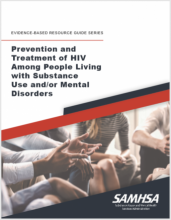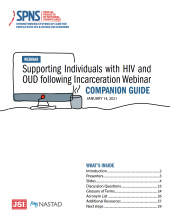
Navigating the HIV and substance use systems of care presents a number of unique challenges, many of which can become more complex depending on a person’s housing, employment, mental health, or economic situation.



Navigating the HIV and substance use systems of care presents a number of unique challenges, many of which can become more complex depending on a person’s housing, employment, mental health, or economic situation.
This guide offers considerations for how state agency staff can develop and maintain an accessible, HIV and opioid use disorder (OUD) service inventory. This guide can be used by state agency HIV and OUD staff to:
The growing opioid crisis across the United States has resulted in an increase in new HIV diagnoses.
This tool aims to assist HIV primary care teams that work in a range of clinical settings to develop and provide enhanced integration of behavioral health (BH) services.
This discussion guide is intended to elicit a comprehensive and concrete conversation about language, stigma, and discrimination as a means of strengthening care systems and ensuring that people who seek care for HIV and/or substance use disorders, including opioid use disorder, are treated with
This month’s Connecting Care episode discusses the impact of structural racism at the intersection of HIV and OUD care and opportunities to think outside of the box to effect change.
In May, the New England AIDS Education Training Center (NEAETC) published a set of pages dedicated to providing information about and resources for HIV and HIV-related topics.
For Boston Health Care for the Homeless nurse Megan Sonderegger, providing client-centered care means literally meeting her clients where they are.
There are so many factors that impact adherence and health outcomes. During this Connecting Care podcast, Drs. Alex Walley, Jessica Taylor, and Sim Kimmel discuss HIV prevention and treatment among people who inject drugs.